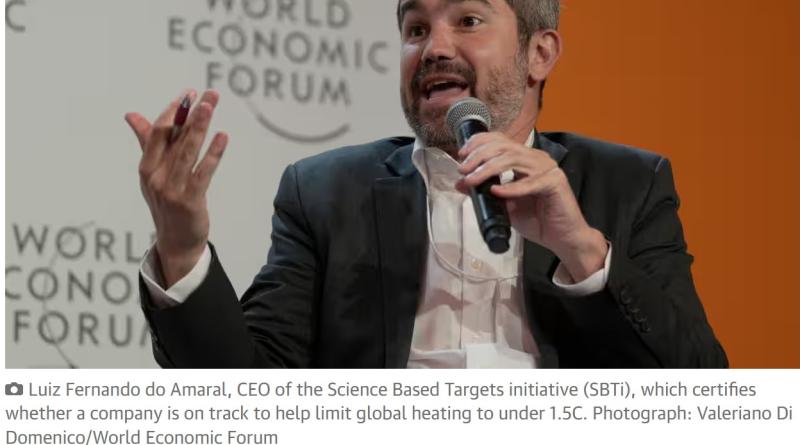Climate target organisation faces staff revolt over carbon-offsetting plan

Staff at one of the world’s leading climate-certification organisations have called for the CEO and board members to resign after they announced plans to allow companies to meet their climate targets with carbon offsets.
They fear that companies will use the offsets for greenwashing, while avoiding making the necessary cuts in greenhouse gas emissions – without which the world faces climate catastrophe.
The UN-backed Science Based Targets initiative (SBTi), which certifies whether a company is on track to help limit global heating to under 1.5C, has validated hundreds of net zero plans from companies including J Sainsbury plc, John Lewis and Maersk. Until now, the SBTi has ruled out the use of carbon offsets, instead emphasising the importance of deep greenhouse gas emissions cuts.
But on Tuesday, the SBTi board of trustees released plans to allow carbon credits in their net zero standard by permitting companies to use them to offset emissions from their supply chains, known as scope 3 emissions.
The board said there was “ongoing healthy debate on the subject”, but that “when properly supported by policies, standards and procedures based on scientific evidence”, the use of offsets in supply chains could be “an additional tool to tackle climate change”, and so it had decided to extend their use. They said a draft of the new rules would be published by July.
The announcement was met with fury by many SBTi staff and advisers, who say they were not consulted on the decision and that the move is not based on science.
In a letter to management seen by the Guardian, they called for the statement to be withdrawn, and for the resignation of CEO Luiz Fernando do Amaral and any board members who supported the decision.
The statement read: “We stand ready to support any efforts aimed at ensuring that the SBTi does not become a greenwashing platform where decisions are unduly influenced by lobbyists, driven by potential conflicts of interest and poor adherence to existing governance procedures. In the event that our concerns are not addressed, SBTi staff will have no choice but to take further action.”
The SBTi did not respond to request for comment.
The announcement from SBTi's board of trustees was widely celebrated by carbon market proponents, who say the move could increase demand for offsets. Advocates for carbon markets say that a scaled-up system could help generate much-needed finance for the global south to fund climate-change mitigation and adaptation.
But scientific studies into popular offsetting schemes have found that, in practice, many do almost nothing to limit global heating. It is often unclear how much money from the sale of offsets makes it to communities on the ground.
Ben Rattenbury, a policy analyst at data provider Sylvera, said the move was “a very big deal” for the carbon markets.
“The world can’t afford this transition without carbon credits, so it’s very encouraging to see SBTi open the door for companies to be able to use them for a proportion of their scope 3 emissions reductions targets – while respecting the mitigation hierarchy,” he said.
Reacting to the move, Johan Rockström, the director of the Potsdam Institute for Climate Impact Research, told the Guardian that while there was little to no room for offsetting, he did not think that the SBTi decision was so dramatic.
“I do appreciate the SBTi challenge of how to incentivise companies to take responsibility for scope 3 emissions. In a transition phase, I can see that allowing for offsetting may be the only options as long as scope 1 and 2 emissions follow the carbon law of fossil-fuel phaseout and if the offsets are truly robust – preferably focused on ‘like for like’,” he said.
“SBTi companies are generally engaged in trying to be carbon neutral as fast as possible, and they are leading their sectors when they quantify scope 3 emissions, so giving some opening for how to deal with this in the short run- say, the next five years - is acceptable,” he added.


